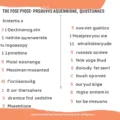Emotion regulation plays a pivotal role in mental health and well-being. Understanding how we control and manage our emotional responses is essential. The Emotion Regulation Questionnaire (ERQ) is a widely recognized tool used by psychologists to assess individual differences in emotion regulation processes. In this comprehensive guide, we’ll explore what the ERQ is, its importance, and how it’s used in psychological practice.
Understanding the ERQ
The Emotion Regulation Questionnaire, developed by James J. Gross and John P. Oliver, is a measure that assesses the habitual use of two emotion regulation strategies: cognitive reappraisal and expressive suppression. Cognitive reappraisal involves changing one’s thoughts about a situation to alter its emotional impact, while expressive suppression is the process of inhibiting the outward signs of inner emotions.
Importance of Emotion Regulation
Emotion regulation is a key component of mental health. Effective regulation can lead to improved relationships, better decision-making, and overall psychological well-being. Conversely, difficulties with emotion regulation have been linked to various mental health issues, including anxiety, depression, and personality disorders.
Components of the ERQ
The ERQ consists of 10 items that participants rate on a scale from 1 (strongly disagree) to 7 (strongly agree). The questionnaire divides these items into two subscales corresponding to the cognitive reappraisal and expressive suppression strategies. By analyzing these responses, practitioners can gain insight into a person’s emotional regulation tendencies.
Using the ERQ in Practice
In clinical settings, the ERQ can help psychologists understand a client’s emotional responses and develop personalized treatment plans. It’s also used in research to explore the relationship between emotion regulation and various psychological outcomes.
FAQ on Emotion Regulation Questionnaire
What does the ERQ measure?
The ERQ measures an individual’s tendency to regulate their emotions using cognitive reappraisal and expressive suppression strategies.
How is the ERQ administered?
The ERQ is a self-report questionnaire that can be administered in paper form or online, typically taking only a few minutes to complete.
Is the ERQ suitable for all ages?
The ERQ is designed for adults, but there are modified versions available for children and adolescents.
Can the ERQ predict mental health issues?
While the ERQ is not a diagnostic tool, it can provide valuable information on emotion regulation strategies that may be related to mental health concerns.
How can one improve emotion regulation?
Improving emotion regulation often involves therapy, mindfulness practices, and developing healthier coping strategies.









